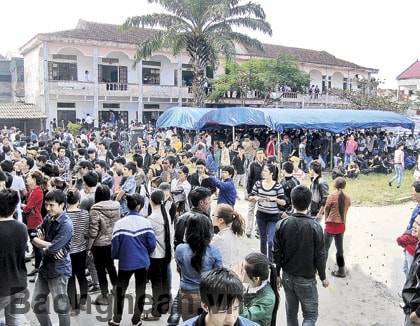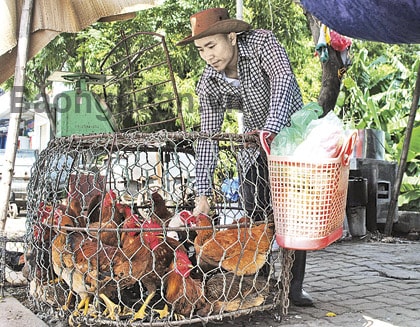Part 1: "Do what you want, suffer what you have to"
Since 2004, the Ministry of Labor of Vietnam and South Korea has signed an agreement on the program of granting work permits to Vietnamese workers in South Korea. Since then, 63,000 Vietnamese workers have gone to work in South Korea, bringing in a significant income. However, recently, the Ministry of Labor of South Korea has continued to suspend this program with the reason given: Vietnam has a very high rate of workers staying illegally after the end of their contracts. This has directly affected 12,000 workers who have passed the Korean language test nationwide; in which Nghe An is the province with the largest number of "waiting" workers: nearly 3,000 people.
(Baonghean) -Since 2004, the Ministry of Labor of Vietnam and South Korea has signed an agreement on the program of granting work permits to Vietnamese workers in South Korea. Since then, 63,000 Vietnamese workers have gone to work in South Korea, bringing in a significant income. However, recently, the Ministry of Labor of South Korea has continued to suspend this program with the reason given: Vietnam has a very high rate of workers staying illegally after the end of their contracts. This has directly affected 12,000 workers who have passed the Korean language test nationwide; in which Nghe An is the province with the largest number of "waiting" workers: nearly 3,000 people.
By chance, I met Le Van Hue who was busy with some chicken cages at the end of Doi Cung market (Vinh city). I was surprised: "I thought you "flew" to Korea?". This young man born in 1988 smiled sadly: "I've been waiting for almost a year, sister. I don't know what to do for the future, so during the day I help my younger brother pluck chicken feathers at the market, and at night I go online to look for new information. I wonder when Korea will accept Vietnamese workers again?"

Crowding to buy application forms and register for the Korean language test at Nghe An Job Introduction Center
While waiting to be recruited, Le Van Hue made a living by plucking chicken feathers.
Hue is from Hoang Hoa, Thanh Hoa, but has been living in Vinh City for several years now. Because of the difficulties in her hometown, Hue asked her parents to go to Vinh with some cousins to find a way to make a living. Among Hue's cousins, there is Vo Sy H. (from Nghi Lien, Nghi Loc) who has been working in Korea for several years. Seeing the potential, he encouraged Hue to go there. Hue has been plucking chicken feathers at Doi Cung market while attending a language course at the Vietnam - Korea Industrial Technical College. Hue has envisioned a future for herself after passing the Korean language test (scoring 188 points) held in Hanoi at the end of last year: She will work hard, earn some capital to help her elderly parents, and maybe start a business. Then she heard a broker say that Hue is from another province, so she must have a vocational secondary school diploma to meet the requirements to go, and if she wants to go early, she must submit her application first. If you want to push your application forward and get a college degree, you have to “run” 5,000 USD. Hue frantically borrowed money, but luckily someone helped her later, so she was able to get back the money she “ran to get to go early”. “I spent a few million VND on the test in Hanoi”. Hue added that after taking the Korean language test, those who meet the requirements are often contacted by “brokers” to pay money to put their names online and push their application forward. “I don’t know if it’s because I asked for my money back, but now I can’t see my name online. I also don’t know where my application is now”. So, not only was Hue anxiously waiting for the day when Korea would accept workers again, but she was also worried about why her name wasn’t on the list. Waiting sometimes made Hue lose all hope.
Nguyen Van Hai (born in 1984) is an orphan who has lived at SOS Children's Village Vinh since childhood. After graduating from high school and going to vocational school but not finding a job, in 2010, Hai decided to learn Korean with the dream of going abroad to work to "change his life". After more than a year of diligently studying the language and waiting, Hai and his friend from the Children's Village, Nguyen Huu Nhan, borrowed money and packed their bags to go to Hanoi to take a test "more rigorous than the university entrance exam". But Hai and Nhan both passed with very high scores. Both happily submitted their applications and leisurely waited for the day they could "fly". During the waiting time, both of them could hardly do anything, going online every day to check their applications and see if they were recruited by the Korean side. When the validity of their Korean language certificate was about to expire, they received news that the Korean side had temporarily stopped recruiting Vietnamese workers. “Hearing the news, our limbs went numb. All our hopes and dreams gradually disappeared. Who knows when the next opportunity will come to people at the bottom like us?” - Hai confided. Both Hai and Nhan said that to get the Korean language test certificate, they had to struggle to rent a room and eat out for a whole year. During the waiting time, they could not do anything worthwhile. Some companies in Vung Ang, Hanoi, and Ho Chi Minh City also contacted and invited them to work, but they did not dare to accept because they were afraid of missing the opportunity to go to Korea.
Hoang Van Binh (born in 1985), from Bich Hao, Thanh Chuong, also fell into the same "half-crying, half-laughing" situation as Hue, Hai and Nhan. After going to Malaysia to work but not having enough money to pay off his debt, Binh returned to study shipbuilding, but after graduating, he still could not find a job. Binh continued to study to become a skilled mechanic and plastic door worker, and was invited to work by many door manufacturing companies. While working with a salary of 5 million VND/month, Binh went to school and passed the Korean language test to the joy of his whole family. Knowing that Binh was anxiously going to Korea, the plastic door company where Binh worked let him go. Waiting for the day to be called, Binh and his relatives lived in anxiety because the money borrowed to study the language was about to be paid back, and his certificate was about to expire. He had a girlfriend, but Binh did not dare to get married because he was afraid that if he was called while preparing to get married, he would miss out on work. Now, when he heard that Korea had stopped recruiting workers, Binh was so disappointed that he became pessimistic, and sometimes turned to gambling and drinking to relieve his stress. “Because so many Vietnamese workers over there have stayed illegally, people like us have missed our chance. Now, not only me but my whole family is crying,” Binh sighed.
The feelings of Hue, Hai, Nhan, Binh mentioned above are also the common feelings of nearly 3,000 workers who have passed the exam and have submitted their applications to Korea to wait for recruitment and their families in our province. For many years, the Korean market has been a popular market for Vietnamese workers. The cooperation in sending Vietnamese workers to Korea is a great success between the two ministries and the two countries, increasing income and creating jobs for Vietnamese workers. Currently, Vietnam has about 75,000 workers working in Korea, of which the number going under the Korean Employment Permit Program for Overseas Workers (called EPS) is about 63,000 people. Nghe An is the province with the second largest number of workers going to Korea in the country (under the EPS program from 2005 to present is about 5,000 people). Vietnamese workers in Korea have a fairly high income, averaging from 900-1,200 USD/month. However, recently, there has been a prominent situation of many workers whose labor contracts have expired and illegally stayed to work in Korea, negatively affecting the labor policies that the two countries have signed. The rate of illegal stay of Vietnamese workers is too high, up to over 50%, in which Nghe An is the locality that is "named" with the highest number of illegal workers. Some communes and wards are specifically named: Khanh Son, Da Son, Linh Son, Nghi Hai, Nghi Hoa, Nghi Tan, Vinh Tan... Currently, the number of illegal workers in Nghe An, since 2005 alone (under the EPS program) is 383 people. This is the reason why the Korean side announced a temporary suspension of recruiting Vietnamese workers (Vietnam is also the only country that is "said no" in this country).
In recent days, after receiving information from the neighboring country, nearly 12,000 Vietnamese workers who passed the Korean language test (Nghe An has 2,946 people) were shocked while waiting. Most of them come from poor villages with aspirations to change their lives. They saved money, borrowed money to study and take exams, now facing the risk of being rejected is an overwhelming burden for them.
(To be continued)
Thuy Vinh






